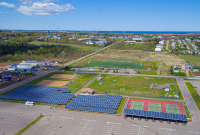Support strong Canadian climate journalism for 2025
Warning: This story discusses suicide. For those in need, the Hope for Wellness Helpline provides immediate and culturally safe telephone crisis intervention support for all Indigenous Peoples in Canada, 24 hours a day, seven days a week at 1-855-242-3310 or chat online at hopeforwellness.ca. Services are available in English and French, as well as Inuktitut, Cree and Ojibway upon request. Youth in need of support can also call the Kids Help Phone at 1-800-668-6868 or text 686868.
The federal government and national Inuit organization Inuit Tapiriit Kanatami (ITK) announced a new investment on Oct. 6 to help prevent suicide among Inuit. The funding adds to ongoing work, including culturally specific first aid and a partnership with Kids Help Phone.
Currently, the rate of suicide for Inuit men and boys is 500 per 100,000 — 40 times greater than the non-Indigenous population, according to an article recently published in the journal Qualitative Research in Health.
Different regions are dealing with their own crises. In the Northwest Territories, which covers the majority of Inuvialuit, one of four land claim organizations for Inuit in Canada, 18 people have died by suicide this year, up from 11 deaths last year.
Effects of colonization have a direct impact on these higher suicide rates, according to the article, which was authored by experts from Canada and Australia. Some of the possible causes for higher suicide rates include intergenerational trauma, the changing nature of the economy in the North and the inequities faced within institutional structures.
The new announcement builds on the National Inuit Suicide Strategy, an Inuit-led and evidenced-based approach to reducing suicide in Inuit Nunangat, the homeland for Inuit in Canada, developed in 2016.
All decisions on how funds will be allocated will be decided by the four land claim organizations of Inuit Nunangat, ITK president Natan Obed said in an interview.
But urban Inuit will not be directly supported through the initiative, said Joël Lamoureux, the communications manager for Tungasuvvingat Inuit, an urban Inuit organization based in Ontario that delivers services in Ottawa and Toronto.
Instead, there are national programs in place for suicide prevention, including, for example, the Kids Help Phone partnership that supports Inuit nationwide, Obed said.
Funds will also be allocated to land claim organizations, which have a responsibility to work with their beneficiaries no matter where they live, he added.
“I do know land claim organizations are eager to work more closely with their associated urban counterparts on identifying ways to use these funds,” Obed said.
Funding will be split between the four regions based off ITK’s funding formula, which distributes money on a population per capita basis. The funding formula sometimes changes to be needs-based, but not in the case of suicide prevention, Obed said.
“Inuit regions are all affected by suicide and equally are united around the needs, so this allocation will be decided by the ITK board, but will most likely fund through the funding formulas already established,” he said.
The funding formula is roughly 50 per cent for Nunavut, 25 per cent for Nunavik (northern Quebec), 13 per cent for Inuvialuit (Northwest Territories) and 12 per cent for Nunatsiavut (Labrador), give or take two to three per cent, Obed said.
For Lori Idlout, the NDP critic for Indigenous Services, the funding doesn't go far enough.
"In Budget 2022, the government committed $228 million dollars for culturally appropriate, Indigenous-led mental health services for over two years. The announcement of $11 million dollars today does very little to assure Indigenous communities that they’ll get the help they have been promised. It is no where near enough," Idlout said in a press release.
When asked if more funding will be made available on a needs-based basis, Indigenous Services Minister Patty Hajdu said she had further conversations with Obed around funding on the day of the announcement.
Indigenous Services Canada is open for additional funding in the future if ITK requires it, Hajdu said in an interview, and is not opposed to working with other communities or community leaders to get money and services to people who need it, she added.
“There isn’t a one-size-fits-all approach to this work.”
The minister didn’t say directly how much more funding may be made available.
— With files from Emily Blake, The Canadian Press
Matteo Cimellaro / Local Journalism Initiative / Canada’s National Observer







Comments